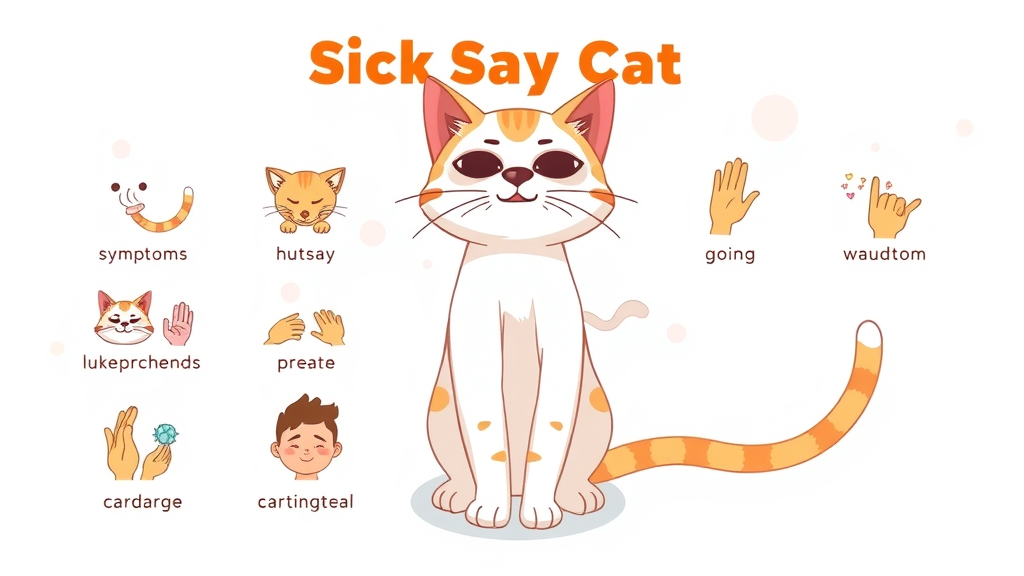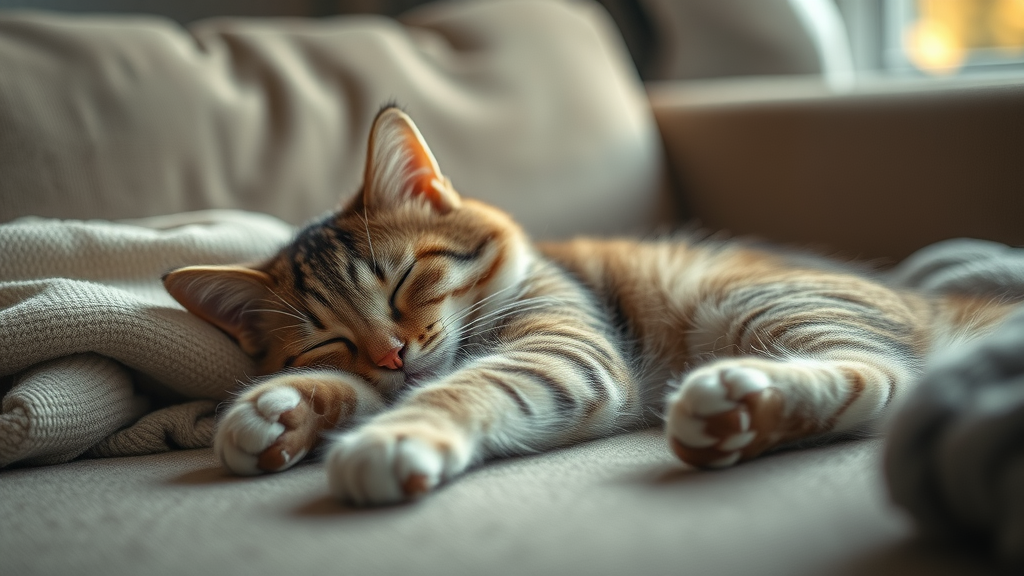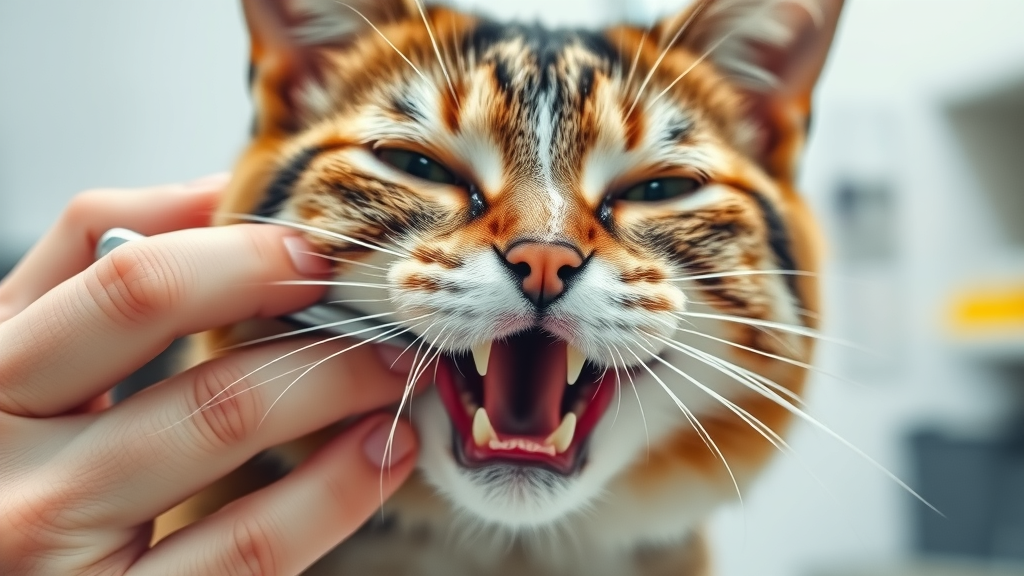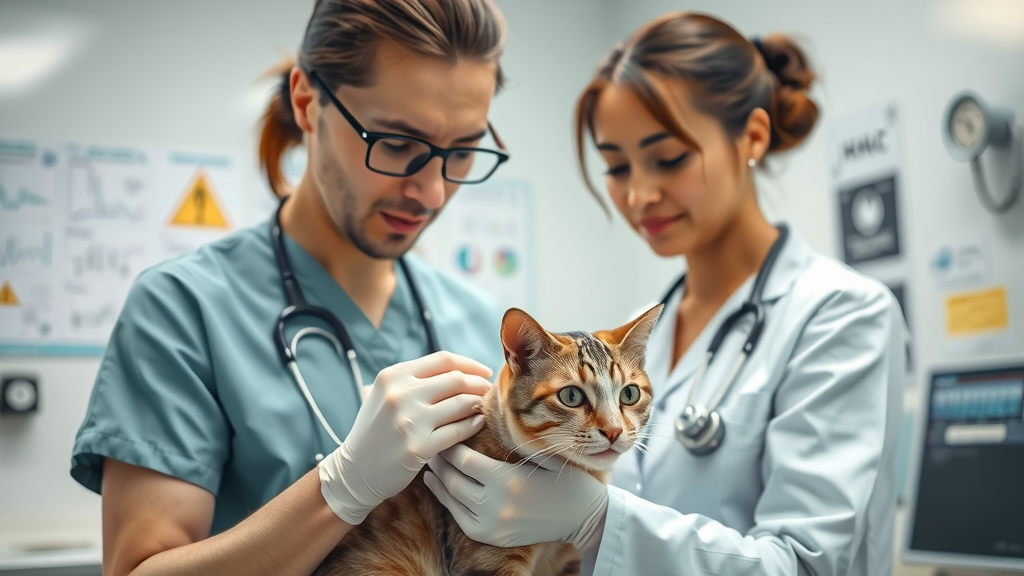- Did you know more than 60% of cat owners miss the early warning signs of illness in cats? Catching these subtle changes early can make the difference between a minor issue and a life-threatening emergency.

How Can I Tell If My Cat Is Sick? Spotting Early Signs Your Cat May Be Sick
- Discover the key early warning signs your cat may be sick , understand when to take action, and learn how to monitor your cat’s health at home.
Cats are experts at hiding any sign of illness. If you’re asking yourself "how can I tell if my cat is sick?", it’s important to pay attention to subtle signs that might indicate a problem. Some changes, such as a drop in energy level or a new weight loss , can develop gradually and be easy to miss. Others, like vomiting or sudden withdrawal, may happen fast. Observing your cat’s body language , routines, and even their litter box habits are crucial steps in identifying these subtle signs of illness.
When you notice any change—big or small—in the way your cat is behaving, eating, drinking, or grooming, early detection becomes vital. Left untreated , even a subtle sign can point to an underlying health problem like kidney disease or dental issues. Always remember, knowing the signs your cat may not be well is the first step to making sure your feline friend gets the medical attention they need.
Why It’s Important: The Impact of Untreated Illness in Cats on Pet Health
"Even small changes in your cat’s routine can be the first sign of a bigger problem. Don’t ignore the subtle clues your cat may be giving you." — Veterinarian Dr. Lisa Thompson
Recognizing the signs of illness in your cat early can prevent minor issues from turning into major, even life-threatening emergencies. Illness in cats that goes unnoticed can rapidly worsen, especially in older cats who may have weaker immune systems or existing chronic issues. For example, what seems like a decrease in appetite or a little lethargy could actually signal kidney disease , diabetes, or a urinary tract infection.
Catching these subtle signs early and seeking prompt veterinary care ensures your pet has the best chance for a full recovery. Ilnesses like dental disease or digestive troubles are much easier (and cheaper) to treat when caught early. Keeping a close watch for signs your cat may be sick is one of the most important parts of pet parenting.
Top 10 Signs Your Cat May Be Sick: What Symptoms to Watch
- Noticeable changes in appetite or weight loss
- Excessive thirst or urination
- Lethargy or decreased energy level
- Vomiting or diarrhea
- Changes in litter box habits
- Bad breath or drooling
- Difficulty breathing or persistent coughing
- Sudden aggression, withdrawal, or other behavior changes
- Unexplained lumps, bumps, or skin changes
- Poor coat condition or excessive grooming

Understanding Signs Your Cat Is Sick: Changes in Appetite and Weight Loss
Appetite changes are often an early sign of illness in cats. If your feline friend suddenly stops eating, eats notably less, or shows increased hunger, it can signal anything from dental care problems to diabetes . Sudden weight loss —especially in older cats —should never be ignored. Sometimes, a sick cat will continue to eat but may not be able to absorb nutrients, leading to silent but dangerous weight loss.
Common culprits for appetite or weight changes include hyperthyroidism , kidney disease , gastrointestinal (GI) issues, and even cancer. Cat owners should weigh their pets regularly and note feeding habits in order to spot subtle sign s early. Make an appointment with your veterinarian if you spot these worrying patterns.
| Symptom | Possible Cause |
|---|---|
| Increased/Decreased Appetite | Diabetes, dental disease, GI issues |
| Sudden Weight Loss | Hyperthyroidism, kidney disease, cancer |
Energy Level Shifts: When Low Activity Means Illness in Cats
A drop in your cat’s usual energy level can signal a health issue. Healthy cats, even older cats , usually have moments of playfulness or curiosity. If your cat suddenly sleeps more, avoids play, or begins to hide from family, these are classic red flags that your cat may be sick. Lethargy often points to hidden infections, pain, or chronic conditions like kidney disease or heart problems.
- Increased sleeping
- Playing less
- Hiding from family
When a cat’s energy level drops, the change is often gradual, so it pays to note ongoing behaviors. If your feline friend withdraws or spends most of the day sleeping, an underlying health problem is possible. Call your vet for advice if you spot these subtle signs—especially if lethargy is paired with other symptoms like vomiting or appetite change.

Litter Box Concerns: What Changes Reveal About a Sick Cat
The litter box is a window into your cat’s health! If your cat starts urinating outside the box, strains to urinate or defecate, or you see bloody urine or feces , it’s time to take notice. These changes can be caused by urinary tract infections, bladder stones, kidney disease, or even diabetes. Quick action is essential, since left untreated, these illness in cats can lead to serious complications.
- Urinating outside the box
- Straining to urinate/defecate
- Bloody urine or feces
Always check for larger clumps in the litter (a sign of increased thirst or urination) and monitor the frequency of cleaning. Be alert for any change in your cat’s litter box routine—especially accidents in older cats —because it’s often a sick cat’s first cry for help. If you notice constipation, diarrhea, or persistent accidents, call your vet for prompt evaluation.
Increased Thirst and Urination: Recognizing Early Signs of Illness in Cats
Sudden increased thirst and urination are strong indicators your cat may be developing a medical issue like diabetes, kidney disease, or hyperthyroidism. If you find yourself refilling the water bowl more often, or see larger, more frequent clumps in the litter box, take note. These early signs can be subtle at first but can spirall into severe health problems if ignored.
- Refilling water bowl more frequently
- Larger clumps in litter box
Constant thirst and urination can also lead to dehydration or even urinary tract infections—especially in older cats. Always consult your veterinarian if you observe these signs, as early intervention can prevent complications and keep your cat comfortable and healthy.
Vomiting, Diarrhea, and Digestive Issues: Indicators of a Sick Cat
Occasional hairballs are one thing, but repeated vomiting , diarrhea , or a sudden lack of appetite point to a bigger problem. Cats that vomit frequently—especially along with weight loss, lethargy, or hiding—may have gastrointestinal illnesses, food allergies, parasites, or other chronic issues.
- Repeated vomiting or hairballs
- Loose or watery stool
- Lack of appetite
Digestive issues can quickly lead to dehydration and require prompt treatment, especially in kittens or older cats. If the vomiting or diarrhea lasts more than 24 hours, or is accompanied by other symptoms like lethargy or weight loss , call your vet right away to rule out a serious health problem.
Oral Health and Bad Breath: Signs of Illness in Cats To Watch Closely
Bad breath in cats—also known as halitosis—isn’t just unpleasant; it can be a sign of dental disease, infection, kidney disease, or even diabetes. Drooling, pawing at the mouth, or visible redness or swelling of the gums are all warning signs your cat may be sick.
- Persistent bad breath
- Drooling or pawing at the mouth
- Red, swollen gums
Regularly check your cat’s mouth for unusual odors, tartar, or sores. Oral health problems left untreated can lead to tooth loss, abscesses, or infection spreading to major organs. Make dental care part of your cat’s routine check-up and reach out to your vet if you spot these signs.

Behavioral Red Flags: Signs That Your Cat May Be Sick
Sudden behavior changes —like aggression, withdrawal, or excessive vocalization—are often early warnings of pain or illness in cats. It’s common for a sick cat to hide in strange places, avoid their owners, or react with hissing or swatting when touched. Your feline friend might also meow more persistently, especially if distressed.
- Increased aggression or hissing
- Unexplained hiding or withdrawal
- Unusual vocalization
Watch for any shift in your pet’s personality or social habits. Dramatic or persistent changes should never be shrugged off as mere moodiness. If these behaviors persist, medical attention is needed to address the physical or emotional root cause behind these signs that your cat may be sick.
How Vets Diagnose Illness in Cats: Common Tests and What To Expect
- Physical exams
- Bloodwork and urinalysis
- X-rays and ultrasounds
- Fecal analysis
When you bring a sick cat to the vet, expect a thorough nose-to-tail physical exam, as well as a conversation about your cat’s behavior and subtle sign changes. Based on the symptoms, your vet may recommend bloodwork, urinalysis, imaging (like X-rays or ultrasounds) , and sometimes fecal analysis to uncover the source of illness in cats.
Early detection is easier when owners provide detailed observations of their cat's appetite, activity, litter box habits, and any new behavioral signs. Based on diagnostic results, your vet will suggest treatments—sometimes simple, sometimes intensive—to get your cat back to health as quickly as possible.

Preventative Care: Reducing the Risk of Illness in Cats
- Schedule regular veterinary check-ups
- Keep up with vaccines and parasite prevention
- Monitor diet and weight
- Provide mental and physical enrichment
The best defense against serious health problems is great preventative care . Book annual or bi-annual check-ups, even for indoor cats or those without visible symptoms. Vaccines, fecal exams, and routine parasite prevention all help protect against common diseases. Pay attention to your cat's weight and nutrition, as overweight or underweight cats are at greater risk for illness and complications.
An engaged and enriched indoor environment helps bolster both physical and mental health. Invest in climbing posts, feeder puzzles, interactive toys, and frequent playtime to keep your pet’s body and mind sharp. Preventative care today means fewer surprises and emergencies for your feline friend in the future.

In this easy-to-follow video, learn how to check your cat’s eyes, ears, mouth, coat, and limbs for early signs your cat may be sick. See what subtle signs to look for, and get step-by-step instructions to help you keep tabs on your cat’s health between vet visits.
Discover how litter box changes can signal illness in cats. This video covers what to look for in terms of clump size, color, frequency, and accidents. Learn what stool and urine changes may indicate, and when it’s time to call your vet.
Join a professional veterinarian as they walk through the process of examining a sick cat. Watch the entire diagnostic procedure from physical exam to lab tests, and see how expert vets spot subtle signs and symptoms of illness in cats.
People Also Ask
How can you tell if a cat is unwell?
- Look for changes in eating, drinking, grooming habits, and activity level . Monitor for vomiting, diarrhea, respiratory problems, and other unusual symptoms that could signal a sick cat. Subtle signs—like withdrawal or hiding—often precede more obvious health issues, so staying attentive is vital.
How do cats lay when sick?
- Sick cats may curl up tightly, hide in unusual places, or rest in a hunched position instead of their normal relaxed posture. Watch for changes in how and where your cat prefers to sleep, as this body language can indicate discomfort or pain.
How do cats act when they get sick?
- Behavioral signs include withdrawal, aggression, reduced energy , loss of interest in play, or excessive meowing . A sudden switch in personality, excessive grooming, or seeking solitude all point toward a health problem that needs investigation.
How to tell if a cat is suffering?
- Cats in pain may vocalize, avoid touch, groom excessively, or show changes in posture and movement . Look for rapid breathing, lack of appetite, or dramatic changes in behavior —each of these signs warns that your cat may be in distress and needs prompt care.
Frequently Asked Questions About How Can I Tell If My Cat Is Sick?
-
What are the most common causes of illness in cats?
The most common causes are dental disease, urinary tract infections, kidney disease, hyperthyroidism, diabetes, and gastrointestinal issues. Older cats are particularly at risk for chronic conditions. Keeping a close eye on subtle signs of illness helps you catch these issues early. -
When should I call the vet about my cat’s symptoms?
If your cat exhibits any of the signs discussed—persistent vomiting, weight loss, severe lethargy, breathing problems, or accidents outside the litter box— call your vet promptly. Rapid changes or a combination of symptoms require immediate attention. -
Can changes in litter box habits signal a sick cat?
Yes. Changes in frequency, appearance, or location of elimination, especially urinating outside the box, often indicate urinary tract or kidney problems, diabetes, or digestive issues. Monitor your cat’s litter box closely for early clues to illness. -
Is vomiting always a sign of illness in cats?
Occasional vomiting or hairballs are typical, but repeated or severe vomiting—especially paired with weight loss or appetite changes—suggests a bigger health issue. Persistent vomiting warrants a vet visit for a proper diagnosis. -
Are some breeds of cats more prone to illness?
Certain breeds have higher risks for specific illnesses (e.g., Persians and kidney disease, Siamese and respiratory issues). However, all cats can develop illness, so regular monitoring and vet check-ups are essential regardless of breed.
Quick-Reference Table: Signs Your Cat May Be Sick and What To Do
| Symptom | Urgency |
|---|---|
| Change in appetite | Consult vet if persists >2 days |
| Weight loss | Schedule a vet visit soon |
| Frequent vomiting | Call vet if lasts >24 hours |
| Difficulty breathing | Seek emergency care |
| Litter box accidents | Monitor and consult vet |
Take Charge of Your Cat’s Health: Next Steps for Busy Cat Owners
- Stay alert for signs your cat may be sick
- Act promptly on any health concerns
- Schedule regular check-ups —and save this guide for reference
Your cat’s health depends on you—observe closely, act fast, and never hesitate to call your vet when signs of illness appear.
Recognizing the early signs of illness in cats is crucial for their health and well-being. The article “Recognizing the Signs of Illness in Cats” from VCA Animal Hospitals provides comprehensive insights into subtle behavioral and physical changes that may indicate health issues in felines. ( vcahospitals.com ) Additionally, “How to Tell When a Cat Is Sick” by PetMD offers valuable information on identifying unusual behaviors and symptoms that could signal underlying health problems. ( petmd.com ) If you’re serious about ensuring your cat’s health, these resources will provide you with the knowledge to detect and address potential illnesses promptly.
 Add Row
Add Row  Add
Add 




Write A Comment